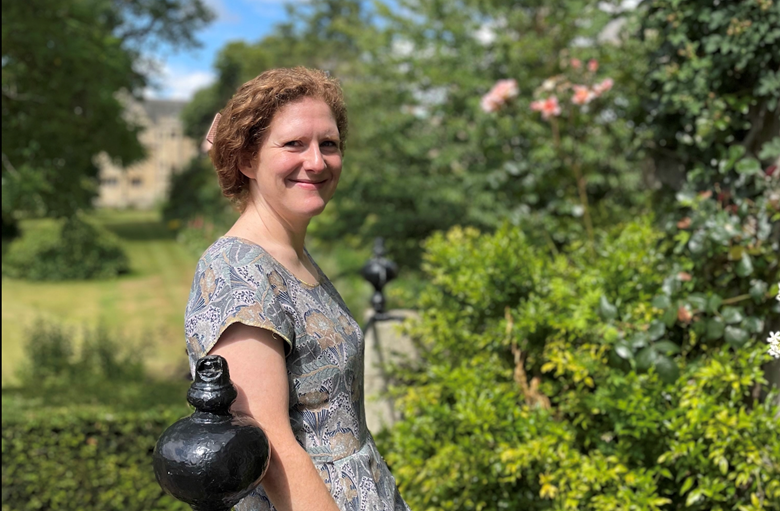'This is the ultimate community work': Cheryl Frances-Hoad on her Southwell Music Festival commission
Hattie Butterworth
Thursday, August 22, 2024
Hearing from composer Cheryl Frances-Hoad about her new work in collaboration with writer Kate Wakeling and the people of Southwell for chorus and orchestra at the Southwell Music Festival

‘There’s something fairly intimidating about writing a piece about the value and joy of music’. Cheryl Frances-Hoad meets me in London Bridge, just a few months before her new work With What Sudden Joy premieres at the Southwell Music Festival. She’s recently completed it, hugely proud of the collaboration with Kate Wakeling and when she speaks about it, I sense its significance, that it perhaps stands out among recent commissions. It’s also the first work to be commissioned by the 10-year-old Nottinghamshire festival, originally planned as a partner piece for the Mozart Requiem. ‘Marcus Farnsworth, the artistic director, wanted to commission a piece that was celebrating the joy of music and, particularly at this time, the value of music. It’s 20 minutes for solo soprano, choir and string orchestra and a very accessible piece. When you’ve got words like that you don’t need to be using complex harmonies and rhythms because the story just needs to be told.’
The words in question have been constructed by writer Kate Wakeling and come from conversations between Wakeling and members of the Southwell community, exploring the value of music in their lives. Reflecting on the experience, Wakeling wrote: ‘Each of these conversations proved terrifically rich and unexpectedly affecting. They were playful, moving, inventive and uplifting. Our discussions explored how music connects to ideas of memory and community, how music and silence interact, and how music can, by turns, offer us solace and spark a sense of celebration.’
'People said what they loved about music was the moment of silence after a piece of music stops. So I wrote this song about silence, which was quite a good challenge!'
‘There was one particular conversation with adults that was incredible,’ Frances-Hoad tells me, ‘people offering their incredibly personal experiences in their lives where music had a vital role. One experience that sticks in my mind most is a woman who said: “My father died. He was really important to me. But I carried on working, I went back to my job, I looked after my children, and then suddenly I thought ‘I just can’t take this any more’. So I drove to my father’s house and I sat in his living room listening to his records for three days, and I just wept and I wept, and then I felt some healing after that process.” ’
This story forms the third poem of the five called ‘I drove to my father’s house’. It strikes me how powerful this community collaboration has been to reflect on music’s power without any toxic positivity or ‘cheesiness’ present.
‘It’s just genius what Kate’s done,’ Frances-Hoad agrees. ‘She’s constructed these five poems and every word in the poems is from the workshop, so it’s directly people experience. It strikes me that it is in a way the ultimate community work – hopefully we’ve written something that is absolutely of the place, and involving the community, but also universal.’
Another poignant moment from the workshops was uncovering the power of silence in music and this became the focus for the fourth poem, ‘Also Silence’. ‘People said what they loved about music was the moment of silence after a piece of music stops. So I wrote this song about silence, which was quite a good challenge!’
I wonder where writing ‘accessible’ or ‘community’ music fits into Frances-Hoad’s life as a composer. How does she balance writing commissions for amateur groups, children and community choruses with the music that challenges both her and listeners?
‘I think the variety is lovely. I’m about to write a string quartet, and I’m gonna go up into my ivory tower. I’m going to stay there and I’m going to love every minute of it! I like to have both, like Britten did. That’s why he’s my idol in terms of the kind of work I want to do. I want to write for kids, I want to write stuff for the ABRSM Grade 1 and then I want to write my ivory tower string quartets.’
It’s always hoped that choral music on this scale will be picked up and enjoy future performances. It feels that the longevity of a piece, and especially this one, is paramount for Frances-Hoad, who says, ‘I really feel it’s something that hopefully is going to be used by music societies up and down the country.’
But for now it’s back to premieres and celebrations for Frances-Hoad, whose cello concerto for Laura Van Der Heijden saw a performance at the BBC Proms with the BBC Scottish Symphony Orchestra in July. Alongside the ivory tower of string quartets the premiere of her Dance Suite for solo piano for Annie Yim at the Presteigne Festival on 26 August and a solo Cello Suite for Natalie Clein at the Wigmore Hall on 29 September as part of an event celebrating Kate Kennedy’s upcoming book Cello: A Journey through Silence to Sound. For this composer, it’s clear when she speaks about loving such a variety of collaborations, she really means it.
With What Sudden Joy by Cheryl Frances-Hoad and Kate Wakeling is at the Southwell Music Festival on Sunday 25 August | southwellmusicfestival.com






